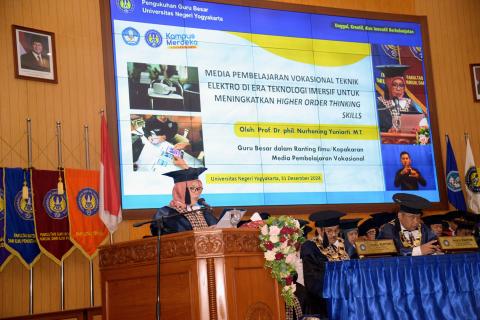You are here
Professor Dr. phil. Nurhening Yuniarti, S.Pd., M.T., Inaugurated as Full Professor in Vocational Learning Media at Yogyakarta State University

Professor Dr. phil. Nurhening Yuniarti, S.Pd., M.T., a faculty member in the Department of Electrical Engineering Education, Faculty of Engineering, Yogyakarta State University (UNY), was officially inaugurated as a full professor in Vocational Learning Media on Tuesday, December 31, at the Main Conference Hall of the Rectorate Building. In her inaugural lecture titled “Vocational Learning Media in Electrical Engineering in the Immersive Technology Era to Enhance Higher-Order Thinking Skills”, Prof. Nurhening highlighted the crucial role of immersive technologies such as Augmented Reality (AR), Virtual Reality (VR), and Mixed Reality (MR) in vocational education.
In her address, Prof. Nurhening emphasized the transformative potential of integrating immersive technologies into vocational learning. She explained that these technologies have the capacity to significantly enhance student engagement, foster the acquisition of practical skills, and strengthen adaptability in the digital age. “Augmented Reality (AR), Virtual Reality (VR), and Mixed Reality (MR) represent groundbreaking innovations that can revolutionize how we design, deliver, and evaluate learning processes,” she stated.
Born in Bantul on June 9, 1975, Prof. Nurhening further stressed the importance of tailoring technology-based learning media to the characteristics of learners. However, she cautioned that the mere adoption of technology is insufficient to ensure success. “Technology alone is not enough without the integration of appropriate teaching strategies and methods. This underscores the importance of synergy between technology and pedagogical expertise in creating a holistic and empowering learning environment,” she emphasized.
She also pointed out that immersive technology in vocational education has the potential to create profound learning experiences. By engaging students in activities that demand analysis, evaluation, and creativity, such technology can significantly contribute to the development of Higher-Order Thinking Skills (HOTS). “The application of immersive technology in vocational education enriches learning experiences by involving students in activities that require analytical, evaluative, and creative thinking, thereby playing a crucial role in fostering Higher-Order Thinking Skills,” she added.
The inauguration marked a historic moment for the Department of Electrical Engineering Education at the Faculty of Engineering, UNY. It also underscored Prof. Nurhening’s pivotal contributions to advancing vocational learning media in the era of immersive technology. Her efforts are expected to have a significant impact on the development of electrical engineering education and vocational education at large.
Contact us
Bachelor of Electrical Engineering Education
Faculty of Engineering Universitas Negeri Yogyakarta
Address: Karangmalang, Yogyakarta 55281
Phone : (+62274) 586168 ext. 293, Fax : (+62274) 586734
Copyright © 2026,
